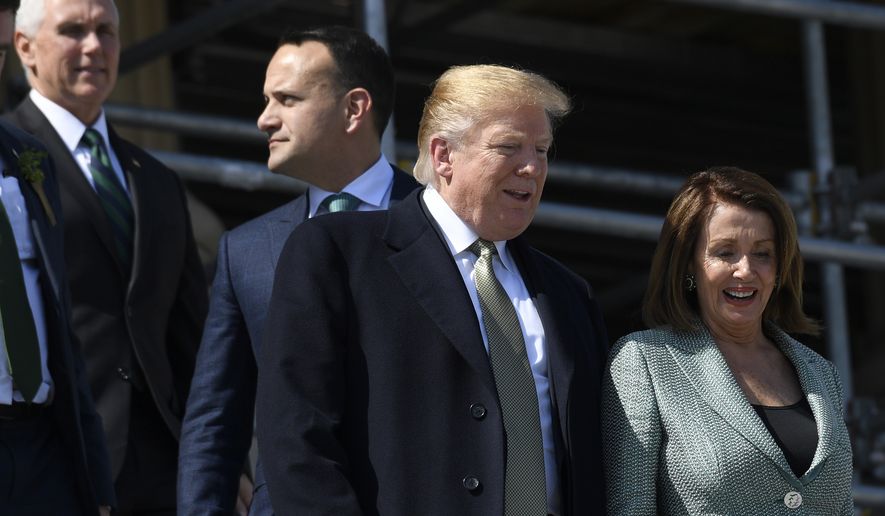Republicans rushed to join Democrats Thursday in rebuking President Trump and his border wall plans, voting to overturn his emergency declaration and prevent him from using some Pentagon money to build new fencing.
The 59-41 vote was worse than Republicans anticipated, and it marks the second black eye that the Republican-led Senate has dealt Mr. Trump this week after Wednesday’s move under the War Powers Resolution to curtail the president’s military commitments to the civil war in Yemen.
Mr. Trump responded on Twitter with one word: “VETO!”
Republicans said they will have more than enough votes to sustain that veto, so Mr. Trump likely will prevail in the end.
But this week showed a Republican Party increasingly willing to join Democrats to defy the president, particularly when they believe their own power as legislators is in question.
“This is a momentous day,” said Senate Minority Leader Charles E. Schumer, New York Democrat. “This is a moment historians will look back on. This could be a moment that changes the fundamental balance of power in our government.”
Twelve Republicans joined Mr. Schumer and his fellow Democrats.
Most of them said they accept Mr. Trump’s claim that the border is in crisis and want additional security, including more fencing. But they said they couldn’t abide a president’s encroachment on Congress’ constitutional prerogative to decide how money is spent.
Fears of a Democratic president using emergency powers to force gun control or impose massive restrictions on greenhouse gas emissions were also prominent.
“This declaration is a dangerous precedent,” said Sen. Lamar Alexander, a Tennessee Republican known as a careful student of government powers.
He led a stream of Republicans who took to the chamber floor to announce their opposition Thursday afternoon as it became clear the party was facing a bit of a rout.
Mr. Trump tried to calm the fears, saying the vote wasn’t about weighty constitutional issues — he insisted he was on firm footing there — but rather about whether the border is secure.
After the vote, he seemed eager to wield his veto pen for the first time.
“I look forward to VETOING the just passed Democrat inspired Resolution which would OPEN BORDERS while increasing Crime, Drugs, and Trafficking in our Country,” he posted on Twitter. “I thank all of the Strong Republicans who voted to support Border Security and our desperately needed WALL!”
The vote was the latest stumble for the president’s marquee campaign promise of a wall on the U.S.-Mexico border.
His promise that Mexico would pay for it has been ridiculed, and his own vision for the wall has been scaled down. A concrete barrier stretching across the 1,954 miles of the boundary has turned into several hundred miles of new steel-slat fencing, plus several hundred more miles of replacement fencing.
Some miles were built in 2017 and 2018, but the administration decided this was the year to kick the wall into overdrive.
To that end, Mr. Trump requested $5.7 billion in last month’s spending bill.
Congress instead agreed to $1.375 billion.
The president signed that bill, averting a second government shutdown, but then issued a declaration calling the border situation an emergency, triggering powers under the National Emergencies Act to shift money.
He directed the Treasury Department to shift $601 million from a forfeiture fund to wall construction and ordered the Pentagon to tap as much as $2.5 billion in drug interdiction money and up to $3.6 billion in military construction money.
The emergency declaration applies to the construction money.
Mr. Trump says he has independent powers under other parts of the law to shift the other money, specifically the drug interdiction money for fencing in drug smuggling corridors.
Republican senators who opposed Mr. Trump said Thursday that, when combined, the nonemergency funds give the president access to nearly all of the money he originally requested.
One surprising vote came from Sen. Thom Tillis, North Carolina Republican, who was one of the first senators last month to announce he would defy the president.
“While I agree with President Trump’s policy goal, I don’t believe in situational principles, and it’s clear what kind of rabbit hole our country can go down when we have a Democratic president who wants more government intrusion into our economy and our lives,” he said at the time.
Yet he voted to back Mr. Trump.
In a statement, he said he had been swayed by conversations with Vice President Mike Pence and top White House officials, along with a vow to rein in emergency powers in the future.
“While the Trump administration is working in good faith with Congress to amend the National Emergencies Act, Democratic leaders have outright rejected attempts to do so, in addition to calling the dire situation at the southern border a ’manufactured crisis,’” Mr. Tillis said.
Analysts said Mr. Tillis’ conversion may have been more political, given increasing talk of a primary opponent next year.
The Democratic Senatorial Campaign Committee said Mr. Tillis should be more worried about voters in the general election.
“When you care more about standing by the White House than standing up for your own state, you’ve lost your way,” the DSCC said.
The DSCC also said Sens. Cory Gardner, Colorado Republican, and Martha McSally, Arizona Republican, whose names will be on ballots next year, could face voter anger for backing Mr. Trump.
Meanwhile, others wondered what Trumpian retribution would befall the Republican lawmakers who defied him.
Sen. John Cornyn, a Texas Republican who sided with the president on the vote, said he hoped Mr. Trump would veto the bill and take Congress’ eventual vote to sustain the veto as a victory.
“I think he ought to accept that as a win and move on,” Mr. Cornyn said, doubting there will be any lingering bad blood. “We need each other. That overcomes hurt feelings every time.”
⦁ Gabriella Muñoz contributed to this report.
• Stephen Dinan can be reached at sdinan@washingtontimes.com.




Please read our comment policy before commenting.